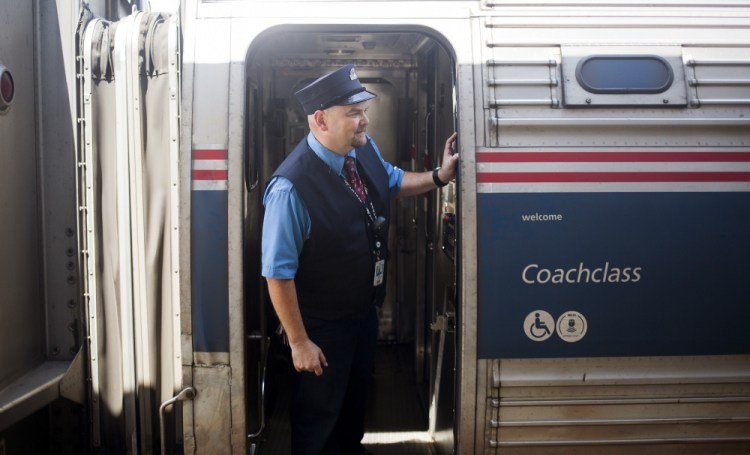Construction of a four-mile stretch of railroad track north of Portland will allow the Downeaster to run five daily round trips between Brunswick and Boston, greatly expanding a service that has seen an increase in ridership despite being constrained by infrastructure and track capacity.
The $9.3 million Royal Junction Siding project is expected to begin next year and will add a second stretch of tracks along the railway through Falmouth and Cumberland. The siding will be installed parallel to existing track and will allow trains to pass one another at speeds up to 60 mph.
The Downeaster runs a full schedule of five daily round trips between Portland and Boston. But, because there is a single track between Brunswick and Portland that is used for both passenger and freight rail, the Downeaster service can only schedule two of those trips from Boston to Freeport and Brunswick.
“When you have what is essentially a one-lane road that is 30 miles long, that really limits the number of Downeaster trains we can run and it limits the schedule,” said Patricia Quinn, executive director of the Northern New England Passenger Rail Authority, the agency that operates the passenger train.
Downeaster ridership has rebounded this year after harsh winter weather and a tie replacement project in 2015 produced delays, disruptions and cancellations.
Interactive: Christian MilNeil
In 2016, passenger numbers are back to the levels of two years ago. A total of 51,402 passengers rode the train in July, breaking a record of 50,271 passengers set in 2013.
While completion of the siding is more than a year away, the Downeaster is expected to expand to three-round trips to Brunswick this fall after the completion of a train layover station that will allow the operator to park trains at the northern end of the route.
The longer-term addition of the new rail track, called a passing siding, will allow all five of the Downeaster’s daily round trips to travel between Boston and Brunswick. The hope is that a new track and expanded service will improve flexibility and increase ridership, Quinn said.
“People like options,” she said last week. “The more transportation options we can provide, the more frequency between Brunswick and Boston, the more successful we can be.”
Interactive: Christian MilNeil
The rail authority has been trying to get funding for the Royal Junction project since 2012, when the Downeaster extended service to Freeport and Brunswick, Quinn said. A $1.15 million contribution from the Portland Area Comprehensive Transportation System this month was the final piece of funding needed for the rail construction. Federal funding will pay for 80 percent of the project. The remainder will be covered with matching funds from the state.
Pan-Am Railways owns the track and the company will construct the siding within its right of way. The stretch will run parallel to a length of track from Field Road in Falmouth to just beyond Greely Road in Cumberland. The project is not anticipated to create additional environmental impacts, the rail authority said. Construction is slated to begin next year and last into 2018.
The Royal Junction project is moving forward just as the rail authority is putting the finishing touches on a 60,000-square-foot train holding and service facility in Brunswick. Currently, Downeaster trains need to return to Portland for overnight service and storage and then return to Brunswick to start the first trip of the morning.
The layover facility broke ground last year, after a drawn-out battle over the project between the rail authority and a group of Brunswick residents concerned the station would bring noise and pollution to their neighborhood.

The northbound Amtrak Downeaster heads toward it’s stop in Brunswick on Friday. Amtrak secured funding to install a rail siding that will allow the agency to run five daily round trips between Brunswick and Boston. The Downeaster now only runs two-round trips between Brunswick and Boston, but will add a third when it completes a layover shed in September. Brianna Soukup/Staff Photographer
Quinn said the layover station is due to be completed next month and Downeaster trains would start making a third round trip between Brunswick and Boston in November.
Constructing the Royal Junction track and completing the layover station will add ridership from Brunswick, which has consistently exceeded forecasts, said Wayne Davis, chairman of TrainRiders/Northeast, a passenger rail advocacy group.
“We are glad that something we recommended over 20 years ago is finally coming to fruition,” Davis said Tuesday. “The ridership figures are way above forecast. July was the biggest July ever. It just gets better, which is wonderful.”
Send questions/comments to the editors.



